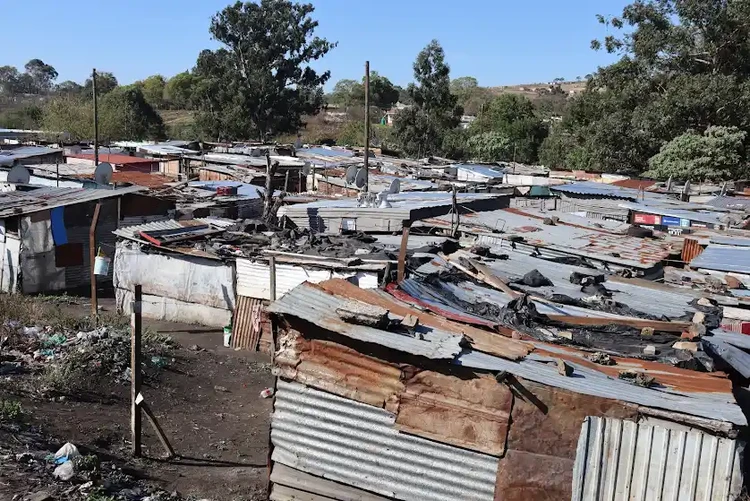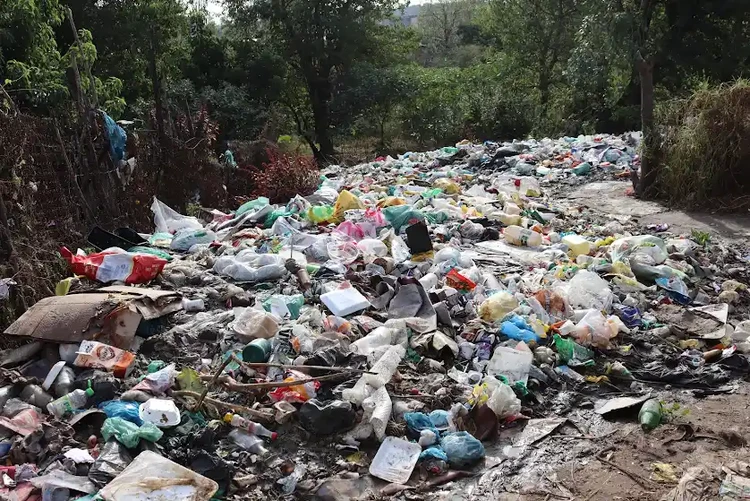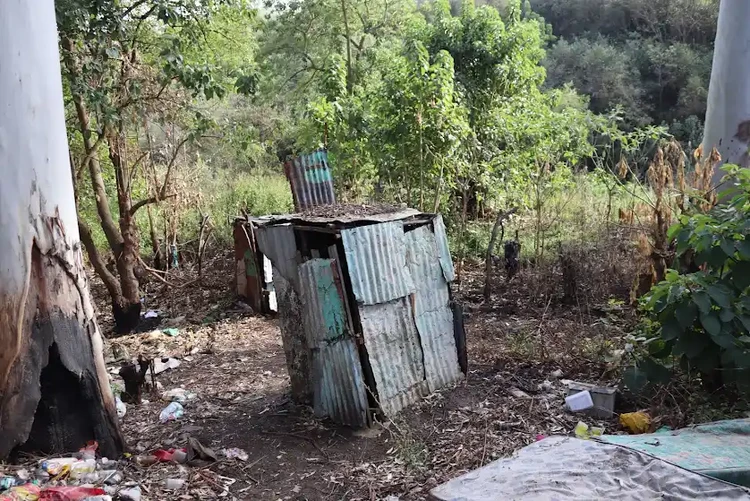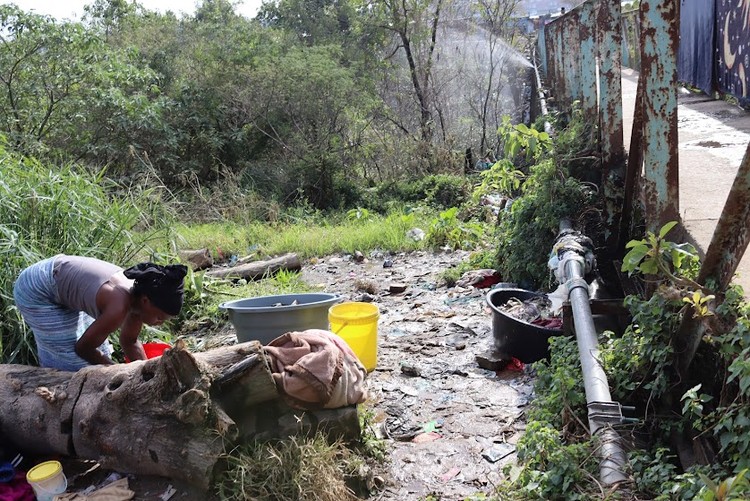No, we won’t move, say Butterworth shack dwellers
Residents of Sikiti informal settlement fear they’ll be forgotten if they agree to move to serviced sites nearby
Residents of Sikiti informal settlement in Butterworth don’t want to be moved to serviced sites. Photos: Manqulo Nyakombi
- Hundreds of families are living in desperate conditions in Sikiti informal settlement in Butterworth.
- The municipality wants to move them to serviced stands three kilometres away, in Zizamele.
- But they say if they go there they will be forgotten, like present residents of Zizamele and nearby Eugene.
- They say they will stay until they are offered RDP houses.
Sikiti informal settlement in Butterworth was described by the municipality in 2019 as “not suitable for human habitation”. But hundreds of families are still living there. The municipality wants them to move to serviced sites in nearby Zizamele but they are afraid that once they move they’ll be “forgotten”, like the other residents of Zizamele and nearby Eugene.
Sikiti was formed in the early 1990s.
Each pit toilet is shared by ten to 15 families. Most residents relieve themselves in bushes, or use plastic bags which they throw in the river. There’s no electricity; residents rely on illegal connections.
Last month Mnquma Local Municipality supplied small solar panels that can be used to charge phones and lights, but not everyone has them.
Residents rely on a water supply they installed for themselves. Each house donated R5 and they managed to install three taps and opened two pipes from old factories. This year two more taps were installed with the help of the ward councillor.
Rubbish is not collected, and there are dump sites all over the settlement, which is walking distance from Butterworth centre.
Rubbish is not collected.
In 2019 Mnquma Local Municipality spokesperson Loyiso Mpalantshane described the land as “not suitable for human habitation”. He said the shacks had been built over sewer pipes which were broken and which posed a health hazard.
Mpalantshane said the municipality had identified an alternative location 3km away and was sourcing funds to install bulk services, such as water and sanitation, for relocating the Sikiti residents.
Five years have passed, and when contacted by GroundUp, Mpalantshane said the plan was still to move the families to the land, which is near Zizamele informal settlement. He said a collective decision had been taken involving the residents’ committees, Amathole District Municipality, Eskom, the provincial Department of Cooperative governance and traditional affairs, and the Department of Water and Sanitation.
Mpalantshane said among many reasons for the relocation of Sikiti residents was the overloading of an Eskom electricity box used to power a sewer pipeline on the land.
“The electricity overload has led to a malfunction of the sewer pump, which led to a constant spillage of raw excrement and posed a major health hazard for the people who live there, especially innocent children,” said Mpalantsane.
But the residents say they won’t move.
Ten families share a single toilet.
Baxolile Myeko, who has lived there since 1995, says residents fear that if they move to serviced sites they will never get proper housing.
He said talks about relocation had started around 2012. Residents had refused to relocate because the land the municipality had identified was far from town and most people in the area are vendors who sell sweets and fruits in town.
“But after we were told that we will go to RDP houses, some residents agreed to be relocated but others were still sceptical. Then they started to register us for RDP houses. The one registration I remember was done in 2015, but there was another one before that. Then after 2015, officials went quiet about the RDP houses until 2019 when we were now told about serviced sites again. We made it very clear that we want houses, nothing else.
“In 2022 the Department of Human Settlements was here after we requested a meeting. We asked the officials about the houses we were promised in 2015. The officials promised to come back but that never happened,” said Myeko.
He said officials had told them they would have to bring their own materials to build the shacks on the new sites.
“We know for a fact that once we agree to move, we will never receive the houses.”
Myeko said people who had already moved to Zizamele were living in poor conditions. “They don’t have electricity and they rely on one tap. Toilets were built years later and were not properly installed. Before flushing one has to go fetch water.”
He said people who had been moved to nearby Eugene were also waiting for RDP houses “and there’s no hope that they will get them anytime soon”.
Nozipho Mvila uses a wheelchair. She told us that she first applied for a RDP house in the early 1990s. The mother of six said she’s been in and out of the municipality offices asking for help with no luck.
“I really thought the officials would consider my condition. I hate this place but I don’t have a choice. This is my only home. At least it is close to town and the clinic, if I don’t have money to hire transport I can still push myself in my wheelchair,” she said.
When GroundUp visited we were shown the foundations of four flush toilets that had not been completed. A few young people were pushing shopping trolleys towards Butterworth centre. They use them to assist shoppers who can’t carry their belongings, charging between R10 to R20 depending on the distance.
Several young children were playing near the dump sites.
Residents draw water from a pipe when they can.
Some of the shacks are built just a few metres away from the river, which stinks.
We met about six community leaders from all three sections, but all refused to give us their names saying there are threats going around. One of the leaders said in May before the elections at a meeting with the officials from the Department of Human Settlements and the municipality some leaders had been accused of blocking the relocation. “Now we don’t want to be targeted,” said one of the leaders.
These leaders told us that the department had promised to get back to them with answers about building RDP houses, as they didn’t have answers for them in May. They are still waiting.
Eastern Cape Department of Human Settlements spokesperson Siyabonga Mdodi promised to respond to questions sent last month, but had not done so by the time of publication.
Support independent journalism
Donate using Payfast

Next: Census 2022 results are “incoherent and implausible”
Previous: Red tape delays Dunoon housing project
© 2024 GroundUp. This article is licensed under a Creative Commons Attribution-NoDerivatives 4.0 International License.
You may republish this article, so long as you credit the authors and GroundUp, and do not change the text. Please include a link back to the original article.
We put an invisible pixel in the article so that we can count traffic to republishers. All analytics tools are solely on our servers. We do not give our logs to any third party. Logs are deleted after two weeks. We do not use any IP address identifying information except to count regional traffic. We are solely interested in counting hits, not tracking users. If you republish, please do not delete the invisible pixel.




